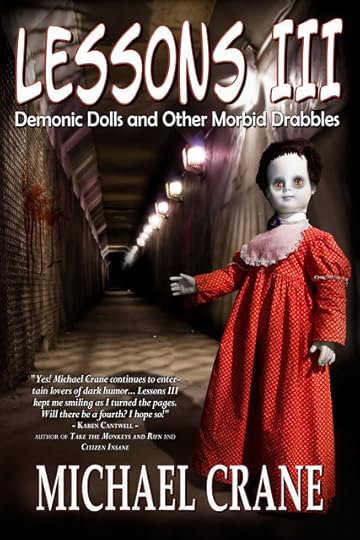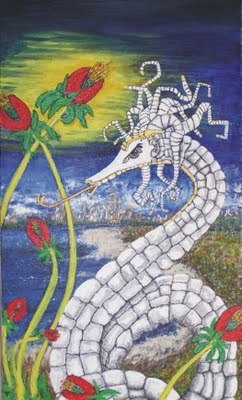Debra L. Martin's Blog, page 329
August 17, 2011
Review of FROM A FAR LAND (JABEN'S RIFT) by G. David Walker
 5 of 5 stars
5 of 5 starsWhenever a book starts out with the sentence, "The others will not know," I am immediately intrigued. Not know what? Who are the others? FROM A FAR LAND sets up this premise to draw the reader in, and boy, was I drawn into this story. The protagonist, Jason Bennett, is an 18-year-old American visiting his relatives in Scotland. Bored with the conversation around the dinner table about his ancestors, he goes off on his own to explore the countryside. What he finds, however, will change his life forever. Buried deep within an ancient stone building on his great-uncle's property, a light shines in a doorway and draws Jason to it. When he steps through, everything changes and he finds out that he is a pawn in a centuries-old battle between supreme beings in the Land of Teleria.
The author does a fantastic job of keeping the action moving. Just when I thought I had figured everything out, another plot twist is thrown into the mix. We learn about Reyga, the Emerald Loremaster, and Jason's guide in this strange land, the other Loremasters of the High Council, magical powers called dimsai, a Shanthi girl named Lenai, strange warrior beings and an event called The Devastation that somehow helped create the supreme beings.
Through half-truths and misunderstandings, Jason is plunged into a battle of words and wits between the High Council and the strange outcast Bodann. He must somehow make sense of each side's accusations about the other before it is too late and Teleria is catapulted into a full-scale war. Who is telling the truth? Which side should he trust? Lenai does her best to guide and instruct Jason, but even she is not immune to the effects of the conflict between the supreme beings. To make matters even more complicated, Jason finds out that the High Council believes him to be Jaben, the one cited in an ancient prophesy; the being who has the power to either save or destroy Teleria. Not too much pressure for an eighteen-year-old.
The characters are well fleshed out, the action is non-stop, magical mysteries abound and there is a great battle. Really, what else would you expect from one of the best fantasies I've read this year. Highly Recommended.
Published on August 17, 2011 05:00
August 16, 2011
Spotlight: LESSONS III by Michael Crane

Book Blurb:A sister's doll doesn't take kindly to insults, and proves it.A puppet maker believes his creations are out to get him.A mother can't stand her son's new favorite toy… and for good reason.
In Michael Crane's latest collection of terrifying and darkly comic drabbles, you'll find out why Playtime is only fun for those with vicious intentions. In these 30 100-word stories you'll run into deranged toys with old scores to settle, homicidal sociopaths and other unapologetic creatures that lurk in the shadows.
In LESSONS III: DEMONIC DOLLS AND OTHER MORBID DRABBLES, nobody ever leaves Playtime in one piece…
Features bonus drabbles/shorts from authors David Dalglish, Daniel Arenson, Sean Sweeney, Imogen Rose and Jason G. Anderson.
Buy Links:Amazon Link:
http://amzn.com/B005FCFK1C
Smashwords:
http://www.smashwords.com/books/view/77924
Author Bio: Michael Crane is an indie author and scribbler of inane babble that can sometimes end up as stories. He went to Columbia College Chicago where he earned a BA in Fiction Writing and drank way too many Red Bulls. He is the author of IN DECLINE and LESSONS AND OTHER MORBID DRABBLES, and he also might've written two books while he was in high school, but he refuses to own up to them and that's why they aren't included on this page. He lives in Illinois and is always trying to work on something new, unless he's battling stupid writer's block.
Published on August 16, 2011 05:00
August 15, 2011
Interview with Melody Scott
Can you give us a brief overview of your latest book?Auraria Dead is a real estate mystery/romantic/cozy with a twist. It involves gold mines, Cherokee Indians, crazy relatives and a bit of romance. When two realtors go to see a property they want to sell and fall into a gold mine shaft, they find a skeleton wearing an ex-husband's coat. To put her mind at rest, the protagonist tries to contact her ex, but a little child answers the phone. Meanwhile, the man she's involved with seems to be using her, she's trying to make a buck and her real estate partner is undermining their deal. Her cousin won't keep her clothes on and her father isn't who she's thought he was for almost forty years.
Did you try the traditional route to publishing, i.e. querying agents/publishers? I've been writing books for 16 years. I stopped counting submissions to agents and publishers after sixty-eight of them either didn't answer at all or sent pre-printed rejections. Eventually two actually said they wanted the book, but then went out of business before printing.
Do you belong to a critique group? Have they helped improve your writing? I've been with five critique groups to date. The perfect crit group for me would be all mystery writers because of pacing and genre specific situations. However, any help with writing is very beneficial. Crit groups catch glaring errors you should have caught yourself.
What factors influenced your decision to self-publish to Amazon?Mine is not self published, I lucked out and finally attracted a small publisher at a mystery seminar.
Did you hire an editor to review your manuscript before publishing? I think editing is critical. However, I paid an editor to review another of my manuscripts and was not happy when the voice was lost. My publisher did my most critical editing. And this was after I had edited it for years! I don't think you can do it yourself.
Besides Amazon, are there any other sites where your books are for sale? Barnes and Noble and on request from any bookstore. I have several on consignment with small bookstores.
What kinds of marketing [twitter, facebook, blog, forums] are you involved with for promoting your book(s)? I am on facebook but am not happy with the results for my book. Mostly I think bookclubs are my best marketing tool. so far signings haven't been much of a draw. I am a realtor so since my book has a lot of real estate in it, I hope to establish a market with realtors soon. It's only been published for six weeks.
Do you find it difficult to juggle your time between marketing your current book and writing your next book? Definitely. It's hard to do both at the same time and keeps focus scattered. But I'm beginning to schedule better.
What advice would you give a new author just entering into the self-publishing arena? I'd say any new author needs to belong to many groups that they'll be able to market to when the time comes. The wider the base, the more potential for sales. Relationships go a long way with marketing, and people love to know an author.
What's next for you? My books are intended as a series, so I'll keep writing them. I'm not sure how I will publish next time. I don't like the idea of only an ebook because so many people in my target audience still like paper. And people love personal autographs. However, it may not be possible to keep or attract a paper publisher. So we'll see what happens.
Author Bio:Melody Scott was born in San Diego, and graduated from Cal Poly in Pomona, California, After marrying and moving to Cumming, Georgia, she became enamored of the land and obtained her Georgia Real Estate license in 1978. Buying and selling, moving and investing became a way of life until she was drawn to write novels about the land, the history of which still holds a mystique for her.
Today she belongs to the Board of Realtors, Chamber of Commerce, two writing groups, a book club, Sisters In Crime, and Southeastern Mystery Writers of America.
Published on August 15, 2011 05:00
August 14, 2011
Review of Grammar Girl's 101 Misused Words by Mignon Fogarty
 5 of 5 stars
5 of 5 starsI have been a fan of the Grammar Girl's website and have reposted a number of articles such as Lie vs. Lay and Who vs. Whom. These articles can be found in the left sidebar under "Popular Guest Posts." Her website has been invaluable. When I received Mignon's latest book, GRAMMAR GIRL'S 101 MISUSED WORDS, I was thrilled to find page after page of clear definitions and examples of the correct way to use the words.
Did you ever wonder about Hoard vs. Horde? Horde means to gather or congregate in a large group while hoard is to amass a large quantity of something. With each definition of the different similar sounding words, a "Quick & Dirty Tip" is also included to help you remember the difference.
Here's another example: Sneaked vs. snuck. While sneaked is the recommended version, snuck has gained so much ground in the United States that experts already say it is as acceptable as "sneaked." Who knew?
These are only 2 examples contained in this fabulous little book. If you're a writer, then GRAMMAR GIRL'S 101 MISUSED WORDS should definitely be part of your library. Highly Recommended.
Published on August 14, 2011 08:24
August 12, 2011
NEW release: WAYFARER KING, Book 2 of the Kinshield Saga by K.C. May

Amazon buy link: http://www.amazon.com/dp/B005FQKPYU
BN buy link:
http://www.barnesandnoble.com/w/the-wayfarer-king-kc-may/1104685436?ean=2940013167049&itm=1&usri=the%2bwayfarer%2bking
Book description:
Beyonders, evil beings that materialize without warning from the realm of chaos, continue to invade the world of men, destroying everything -- and everyone -- in their path. The most powerful of them all, Ritol, has been confined for two hundred years inside the palace in Thendylath, trapped by King Arek's magic.
Having newly claimed the right to rule Thendylath as king, Gavin Kinshield has no money or army, but he's determined to protect his people from the beyonder attacks. With his new power of Wayfarer, Gavin has the ability to journey to all seven realms. To end the invasion, he must travel to the realm of chaos and summon Ritol. But can he escape before the beyonder champion kills him, devours his soul and takes his place as Wayfarer?
If wizard Brodas Ravenkind has his way, Gavin will never make it that far. Not only does Ravenkind want the throne for himself, he wants revenge for his cousin's murder too. After all, he made a promise the first time Gavin crossed him…
Reviewer's Comments:
This is another fantastic book by K.C. May. I have enjoyed everything of hers that I have read and was extremely excited to get a chance to read The Wayfarer King (The Kinshield Saga). Scott
...it is a straightforward and engaging fantasy, and I was completely immersed in the adventure... The development of the fascinating world Gavin inhabits really pushed my enjoyment up a notch.... Grace Krispy
Author bio:
 K.C. May was born in Chicago and grew up in the mid-western USA and in Hawaii, attended University of Colorado in Boulder and graduated with a B.A. in Russian from Florida State University. In 1985, she moved to Taiwan to teach English and study Mandarin Chinese. She also lived in the Arizona desert for 24 years, where she founded and ran a non-profit Rottweiler rescue organization, studied Ken-po karate, went backpacking, tried sky-diving, dabbled in bodybuilding, did some downhill skiing, renewed her interest in motorcycling, and spent some time on the shooting range. In 2010, she retreated to cooler, greener Georgia. She earns her living as a full-time writer.
K.C. May was born in Chicago and grew up in the mid-western USA and in Hawaii, attended University of Colorado in Boulder and graduated with a B.A. in Russian from Florida State University. In 1985, she moved to Taiwan to teach English and study Mandarin Chinese. She also lived in the Arizona desert for 24 years, where she founded and ran a non-profit Rottweiler rescue organization, studied Ken-po karate, went backpacking, tried sky-diving, dabbled in bodybuilding, did some downhill skiing, renewed her interest in motorcycling, and spent some time on the shooting range. In 2010, she retreated to cooler, greener Georgia. She earns her living as a full-time writer.
Published on August 12, 2011 05:00
August 11, 2011
World of Symbols: Dragons
 The World of Symbols: DragonsMichelle Snyder, the SymbologistWhite Knight Studiowww.whiteknightstudio.com
The World of Symbols: DragonsMichelle Snyder, the SymbologistWhite Knight Studiowww.whiteknightstudio.comFascinating to young and old alike, dragons guard treasures, bring good fortune, kidnap princesses, and are slain by knights; we are in awe of their power and majesty. Yet, though they be the stuff of fairy tales, there is historic basis for these infamous beasts. Dragon lore stems from Celtic and Greek observations of dinosaur bones found at Mongolia's Flaming Cliffs, between 5900 and 3750 BC. As the Celts and Greeks migrated back to Europe from Asia, the stories of these legendary beasts came with them.
The symbolism of dragons differs around the world: some are ferocious and destructive, terrorizing humankind, some are bringers of good fortune and happiness. Dragons can be as small as a silkworm or can fill the entire sky. They are at home in air, on earth, in fire, or in water. They generate lightening, thunder, and rain, and they ensure fertility, order, and prosperity. Since antiquity, dragons have represented the vast primal forces that support the material realm.
Dragons are mythological creatures, both good and evil. Colossal beasts, they are symbols of immense power. Western symbolism emphasizes the negative side of their power and energy; the dragon-foe became synonymous with Satan and has come to symbolize evil. In western literature dragons symbolize intense passion and represent the battle knights must fight against immorality. In the Grail stories, passion is the uncontrollable emotion that drives Tristan and Iseult into their adulterous and tragic love affair; similarly, the dragon which Lancelot kills is also associated with adulterous love. The red and white dragons fighting under a hill where Pendragon tried to build his castle were symbolic of two adjacent nations warring with each other - the white dragon represents the Saxons and the red dragon, the Britons. In Anglo-Saxon legends from 793 AD, dragons are recorded as bad omens: a famine happened shortly after they saw fiery "dragons" in the sky. In Greek mythology Perseus saved Andromeda from being sacrificed to a sea dragon.
Oriental mythology represents the dragon as a positive force, representing power, strength, and good luck. Dragons are revered beings in China and, although fierce, are rarely mean-spirited. Usually long and serpentine, with four legs, Chinese dragons have attributes of other animals: some have horse-like heads, some stags horns, some soles of tigers. Four-toed dragons are associated with the four elements of antiquity (earth, fire, air, water); five-toed dragons are symbols of Chinese emperors. Only the emperor can use this image, for others there are severe penalties for doing so.
Dragons symbolize power, prosperity, and nobility, and they have friends in high places. These powerful creatures represent everything from chaos, power, and the ultimate foe, to wisdom, protection, and the unconscious. Dragons can be benevolent, lazy, or demanding. Not only are the concepts that dragons symbolize quite diverse, but how they are represented is equally so. Dragons can be serpents, reptiles, birds, or snakes. Some breath fire, some do not; the possibility of fire-breathing dragons is supported by the existence of the Bombardier beetle, which spews chemicals from sacs inside onto a predator outside, burning the would-be attacker. Popular and appealing, dragons appear in films, toys, fashions, music, books, and promotions. These fabulous, mythical, and sometimes magical creatures will continue to evolve, diversify, and occupy our imaginations and our planet for a long time to come.
Article and artwork © 2011 Michelle Snyder, author of Symbology: Decoding Classic Images, available at Amazon. Her website is www.whiteknightstudio.com.
Published on August 11, 2011 05:00
August 10, 2011
Who vs. Whom? Which is correct?
Here's another tip from Grammar Girl about the correct usage of who vs. whom. You can find all of her tips at her website http://grammar.quickanddirtytips.com/
 Today's topic is who versus whom. I've received three requests from listeners to cover this topic. Here's Noreen:I just wondered if possibly in one of your episodes you could go through the use ofwho versus whom. I think that's a common misunderstanding with many people who write.And an unnamed caller:Who and whom: that's always a tough one.
Today's topic is who versus whom. I've received three requests from listeners to cover this topic. Here's Noreen:I just wondered if possibly in one of your episodes you could go through the use ofwho versus whom. I think that's a common misunderstanding with many people who write.And an unnamed caller:Who and whom: that's always a tough one.
And then Jen also asked in an e-mail.Who or Whom?So here we go. The words who and whom are both pronouns. I'll have a quick and dirty trick for you later, but first I want you to actually understand the right way to use these words.
First, to know whether to use who or whom, we need to talk about the difference between subjects and objects because you use who when you are referring to the subject of a clause and whom when you are referring to the object of a clause.
I know: subject and object sound pretty abstract, but it's easy. If we think about people, the subject of the sentence is the person doing something, and the object of the sentence is having something done to them. If I step on Squiggly, then I am the subject and Squiggly is the object.
Still having a hard time remembering? Here's my favorite mnemonic: If I say, "I love you," you are the object of my affection, and you is also the object of the sentence (because I am loving you, making me the subject and you the object). How's that? I love you. You are the object of my affection and my sentence. It's like a Valentine's Day card and grammar mnemonic all rolled into one. I love you. You are the object of my affection and my sentence. It's like a Valentine's Day card and grammar mnemonic all rolled into one.Just WhomOK. So you all asked aboutwho versus whom, but what I think you really want to know is just when to use whom, because most people don't go around throwing unneededwhoms into their sentences. So remember, you use whomwhen you are referring to the object of a sentence. Use who when you are referring to the subject of a sentence.
For example, it is "Whom did you step on?" if you are trying to figure out that I had squished Squiggly. Similarly, it would be "Whom do I love?" because you are asking about the object -- the target of my love. I know, it's shocking, but the Rolling Stones were being grammatically incorrect when they belted out the song "Who Do You Love?" which I think was originally written by Bo Diddley.Just WhoSo when is it OK to use who? If you were asking about the subject of these sentences, then you would use who. For example, "Who loves you?" and "Who stepped on Squiggly?" In both these cases the one you are asking about is the subject -- the one taking action, not the one being acted upon.
A Quick and Dirty TipStill too hard to remember? OK, here's the quick and dirty tip. Like whom, the pronounhim ends with m. When you're trying to decide whether to use who or whom, ask yourself if the answer to the question would be he or him. That's the trick: if you can answer the question being asked with him, then use whom, and it's easy to remember because they both end with m. For example, if you're trying to ask, "Who (or whom) do you love?" The answer would be "I love him."Him ends with an m, so you know to usewhom. But if you are trying to ask, "Who (or whom) stepped on Squiggly?" the answer would be "He stepped on Squiggly." There's no m, so you know to use who. So that's the quick and dirty trick: if you can't remember that you use whom when you are referring to the object of the sentence, just remember that him equals whom.http://grammar.quickanddirtytips.com/
 Today's topic is who versus whom. I've received three requests from listeners to cover this topic. Here's Noreen:I just wondered if possibly in one of your episodes you could go through the use ofwho versus whom. I think that's a common misunderstanding with many people who write.And an unnamed caller:Who and whom: that's always a tough one.
Today's topic is who versus whom. I've received three requests from listeners to cover this topic. Here's Noreen:I just wondered if possibly in one of your episodes you could go through the use ofwho versus whom. I think that's a common misunderstanding with many people who write.And an unnamed caller:Who and whom: that's always a tough one.And then Jen also asked in an e-mail.Who or Whom?So here we go. The words who and whom are both pronouns. I'll have a quick and dirty trick for you later, but first I want you to actually understand the right way to use these words.
First, to know whether to use who or whom, we need to talk about the difference between subjects and objects because you use who when you are referring to the subject of a clause and whom when you are referring to the object of a clause.
I know: subject and object sound pretty abstract, but it's easy. If we think about people, the subject of the sentence is the person doing something, and the object of the sentence is having something done to them. If I step on Squiggly, then I am the subject and Squiggly is the object.
Still having a hard time remembering? Here's my favorite mnemonic: If I say, "I love you," you are the object of my affection, and you is also the object of the sentence (because I am loving you, making me the subject and you the object). How's that? I love you. You are the object of my affection and my sentence. It's like a Valentine's Day card and grammar mnemonic all rolled into one. I love you. You are the object of my affection and my sentence. It's like a Valentine's Day card and grammar mnemonic all rolled into one.Just WhomOK. So you all asked aboutwho versus whom, but what I think you really want to know is just when to use whom, because most people don't go around throwing unneededwhoms into their sentences. So remember, you use whomwhen you are referring to the object of a sentence. Use who when you are referring to the subject of a sentence.
For example, it is "Whom did you step on?" if you are trying to figure out that I had squished Squiggly. Similarly, it would be "Whom do I love?" because you are asking about the object -- the target of my love. I know, it's shocking, but the Rolling Stones were being grammatically incorrect when they belted out the song "Who Do You Love?" which I think was originally written by Bo Diddley.Just WhoSo when is it OK to use who? If you were asking about the subject of these sentences, then you would use who. For example, "Who loves you?" and "Who stepped on Squiggly?" In both these cases the one you are asking about is the subject -- the one taking action, not the one being acted upon.
A Quick and Dirty TipStill too hard to remember? OK, here's the quick and dirty tip. Like whom, the pronounhim ends with m. When you're trying to decide whether to use who or whom, ask yourself if the answer to the question would be he or him. That's the trick: if you can answer the question being asked with him, then use whom, and it's easy to remember because they both end with m. For example, if you're trying to ask, "Who (or whom) do you love?" The answer would be "I love him."Him ends with an m, so you know to usewhom. But if you are trying to ask, "Who (or whom) stepped on Squiggly?" the answer would be "He stepped on Squiggly." There's no m, so you know to use who. So that's the quick and dirty trick: if you can't remember that you use whom when you are referring to the object of the sentence, just remember that him equals whom.http://grammar.quickanddirtytips.com/
Published on August 10, 2011 05:00
August 9, 2011
Interview with Aubrie Dionne
Can you tell us a little about your books?My books take you to other worlds, primarily fantasy and science fiction. They are full of adventure and romance, with a happy ever after ending for most involved. If you're looking for a combination of exotic settings, great descriptions, high stakes adventure, and swooning romance, you've come to the right place.
When did you start writing?I began writing seriously about five years ago, but I've been writing all my life. In high school I wrote my first novel about a girl who plays flute in band at school and travels back in time to a medieval court. She impresses the king with her flute playing and joins his band of royal minstrels.
Thank goodness that book never came out!
The reason why I started to write seriously came from my primary job: teaching flute. I make up stories to go with the music to keep my students' interest and make them play with emotion in a technique called visual imagery. The stories grew more and more elaborate, and some of my students said I should start writing them down, so here I am today!
What did the process teach you?The process of writing is a discipline, just like music. I have to practice an hour to two hours a day to keep up my flute skills, and the same goes with writing. I shoot for a thousand words a day. Just like I'll always be striving to be a better flutist, I'll also be striving to be a better writer. It's a life-long endeavor, and you can always work on honing your craft, no matter how far you are in the process.
Are you self-published or did you use an independent publisher?I have a bunch of indie publishers: Entangled Publishing, Lyrical Press, Gypsy Shadow Publishing, Wyvern Publications. They allow me to have a say in my book covers, and some of them allow me to make my own covers for my books, which I enjoy.
What genre do you write in the most?I write fantasy and science fiction. Writing is a form of escapism for me, and how can you escape if you write about everyday life? I love creating my own worlds. My favorite movies growing up were Star Wars, Star Trek, The Last Unicorn, Conan the Barbarian, and the Goonies- all fantasy and sci fi movies. I read a lot of fantasy and sci fi growing up, especially Tad William's Memory, Sorrow and Thorn trilogy. So I write what inspired me as a kid.
I tried writing horror once, and everyone said it wasn't scary. At. All. So I'm going to stick with fantasy and science fiction for now J. (Even though I do enjoy all the great horror classics as well)
You book Paradise 21 is a space opera. Tell us about the genre:A space opera is a science fiction setting that focuses on the action, romance, and dramatic elements of the plot instead of the complicated science behind it. There are still fantastical scientific ideas, but they are a subplot to the main action.
In Paradise 21, there are spaceships, sandworms, alien eggs, lizard men, and neat scientific ideas like creating a corridor in space between two moving ships. But the main focus and the character motivations are based on romantic notions.
Paradise 21 is my fourth complete novel. I've also published a space opera Novella, Nebula's Music, which has done well on Kindle, and a bunch of short stories including a series of carnival stories called the Carnival of Illusions series.
Which one should people start with?They should start with the one that interests them the most! Do you like a rip roaring space adventure, complete with sandworms, lizard men, and space travel? Then start with Paradise 21. Or how about cyborgs and romance- then Nebula's Music is best for you. Messenger in the Mist is more a fantasy/mystery with a sci fi twist. Malicifer is a short epic fantasy with a cursed sword, a sea monster, and zombies.
Have you seen a change in the independent publishing community?I've seen a lot more successful independent publishers, which is a wonderful development. Entangled Publishing is the most high profile indie publisher I've worked with. They are a marketing machine, complete with publicists.
Do you read other independently published authors works?Of course! I love how the independently published stories don't always fit in the genre box. I make sure to read all of my critique partners' stories once they come out, and my other indie writing friends. I also think it's important to read the other books that your publisher has published.
Where can people find your books and which source has been the must successful for you?Amazon and Barnes and Noble have been the most successful for me. But you can also purchase them directly from the publishing companies.
Do you have any advice for someone who would like to be an Indie author?You have to write more than one book! I thought I'd write one book, and then I'd be famous. But for the vast majority of writers out there, it takes a number of books before you really start to develop your own unique style and craft. Writing four or five, or ten books seems like an insurmountable task, a lot of work up front with no payback, but if you write for an hour or two every day, you'll be cranking the novels out in no time!
Also, you need critique partners and beta readers to keep your novel sharp. You're too close to your own writing to edit the work all by yourself and perfect all the character motivations and scenes. Think about how many people are involved in making a movie. The same goes for a book. I have 4-6 critique partners and 2 beta readers for every project. In turn, I get better critiquing their work as well.
Do you do your own cover art or do you have someone do it for you?I do a lot of my own covers- all of the Carnival of Illusions Series, Malicifer, and the Seasons of Fantasy Series. The cover for Paradise 21 was done professionally and I love it.
Do you have any hobbies apart from writing?When I'm not writing, I'm working on my flute career, practicing, playing concerts, and teaching flute students. I just auditioned for the Nashua Symphony and got their sub list, so I'm eagerly awaiting their call. I recently played piccolo with the Granite State Symphony Orchestra and had the opportunity to play Stars and Stripes, one of my favorites.
I have two dogs named Jedi and Leia, and I love to take them for walks. I also enjoy going to the movies, and spend a lot of time with my family since we all live within twenty minutes of each other.
Published on August 09, 2011 05:00
August 8, 2011
NEW Release: THE BLACK GOD'S WAR by Moses Siregar III

Book Blurb:
Against the backdrop of epic warfare and the powers of ten mysterious gods, Lucia struggles to understand The Black One.
Her father-king wants war.
Her messianic brother wants peace.
The black god wants his due.
She suffers all the consequences.
King Vieri is losing his war against the lands of Pawelon. Feeling abandoned by his god, he forces his son Caio, the kingdom's holy savior, to lead his army. Victory ought to come soon.
To counter Caio's powers, Pawelon's prince enters the conflict. Rao is a gifted sage, a master of spiritual laws. He joins the rajah to defend their citadel against the invaders. But Rao's ideals soon clash with his army's general.
The Black One tortures Lucia nightly with visions promising another ten years of bloodshed. She can no longer tell the difference between the waking world and her nightmares. Lucia knows the black god too well. He entered her bed and dreams when she was ten.
The Black One watches, waiting to see Lucia confront an impossible decision over the fates of two men—and two lands.
Reviewer's comments:
"Moses is a fine writer deserving of success, and I think that it will follow ... maybe his project will turn him into the next Amanda Hocking. Personally, I really enjoyed Moses's work." -David Farland, NYT Bestselling Author of The Runelords
"An inventive tale with high command of craft." - Scott Nicholson, Bestselling Kindle Author
Buy Links:
Amazon.com buy link
Amazon.co.uk buy link
Smashwords buy link
Author Bio:
 Moses Siregar III is a co-host of the popular Adventures In SciFi Publishing podcast, where he has interviewed Brandon Sanderson, Patrick Rothfuss, Guy Gavriel Kay, Sherrilyn Kenyon, David Farland, Tracy Hickman, Dan Wells, Michael A. Stackpole, Eric Flint, Laura Resnick, Kristine Kathryn Rusch, Nathan Bransford, Robin Sullivan, and Michael J Sullivan. The AISFP podcast has also interviewed Neil Gaiman, Kevin J Anderson, and Ray Bradbury, among others. Moses has a B.A. in Religion. He lives in Prescott, AZ with his wife and son. 'The Black God's War' is his first novel.
Moses Siregar III is a co-host of the popular Adventures In SciFi Publishing podcast, where he has interviewed Brandon Sanderson, Patrick Rothfuss, Guy Gavriel Kay, Sherrilyn Kenyon, David Farland, Tracy Hickman, Dan Wells, Michael A. Stackpole, Eric Flint, Laura Resnick, Kristine Kathryn Rusch, Nathan Bransford, Robin Sullivan, and Michael J Sullivan. The AISFP podcast has also interviewed Neil Gaiman, Kevin J Anderson, and Ray Bradbury, among others. Moses has a B.A. in Religion. He lives in Prescott, AZ with his wife and son. 'The Black God's War' is his first novel.Aloha from AZ,
Moses
(Blog) ScienceFictionFantasyBooks.net IndieAuthorRockstar.com
Facebook Profile
Facebook Writing Page
Published on August 08, 2011 05:00
August 7, 2011
Dedication to Crystal
This haiku was dedicated to my Crystal from Apple, the Parrot. That is one talented parrot. Thank you Apple for this (and to your human, T.M. Roy for posting your poetry).
Psittacine On Your Ass link: http://appletheparrot.wordpress.com/2011/08/06/for-crystal-the-cat/

Crystal Her lap you warmed
You played; she laughed. Now you purr
Forever in her heart.

Psittacine On Your Ass link: http://appletheparrot.wordpress.com/2011/08/06/for-crystal-the-cat/

Crystal Her lap you warmed
You played; she laughed. Now you purr
Forever in her heart.
Published on August 07, 2011 05:00



